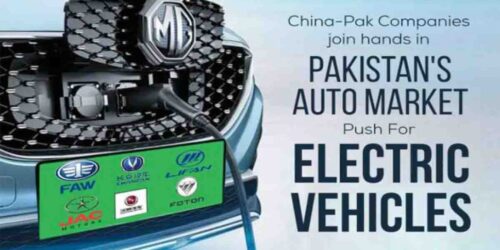SAIC Motor Corporation Limited, China’s largest automobile manufacturer, is to enter Pakistan’s first-ever private sector Special Economic Zone (SEZ) in Raiwind, Punjab, JW SEZ China-Pakistan SEZ, with an estimated FDI of Rs. 663 million and local investment of Rs. 637 million.
The company plans to start manufacturing Electric Vehicles currently (EVs) in Pakistan with its local partner, JW-SEZ. It is not currently clear whether the private SEZ will manufacture vehicles only for the domestic market or also for exports.
Companies are usually set up in SEZs (with special tax and other benefits) to export goods. MG Pakistan is a joint venture between JW-SEZ and SMIL — a subsidiary of SAIC Motor Corporation Limited.
SAIC is a Chinese state-owned multinational automotive design and manufacturing company based in Shanghai. It is also the seventh-largest auto developer in the world and the largest in China.
SAIC bought Morris Garages (MG), a prestigious British brand, in 2006, a name it now uses to market its automobiles globally. Earlier, JW-SEZ signed up with Changsha Foton Motors to form EVsJW Forland to manufacture trucks; with an initial investment of about $150 million, the company built the manufacturing plant.
Vehicles manufactured include trucks, minivans, and cargo vehicles, and so far, about 500 people have been employed for phase one production, expected to be around 30,000 vehicles.

During phases 2-3, a further investment of approximately $300m is expected, and over 100,000 units of electric vehicles are to be manufactured per year. The production plant currently around 50 acres will expand to an additional 100 acres and the company will employ over 3500 new workers to carry on the production.
The new Chinese brands that have entered the country have received an overwhelming response, primarily since the three other major car companies, Honda, Suzuki, and Toyota, have held a large share of domestic auto market sales for decades, and lacked competition which kept prices higher than equivalent international rates and discouraged diversity of products.





